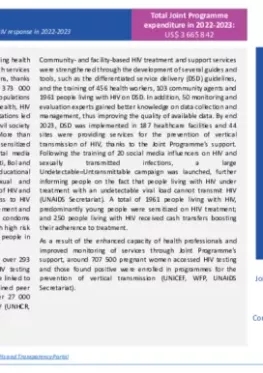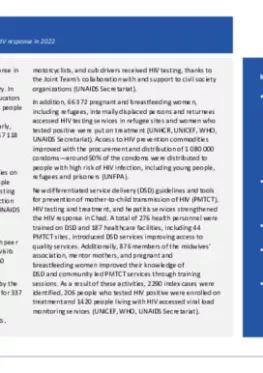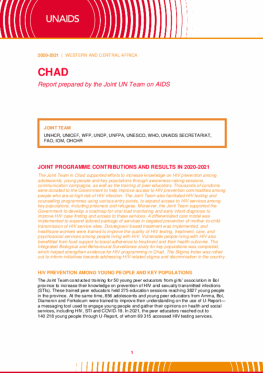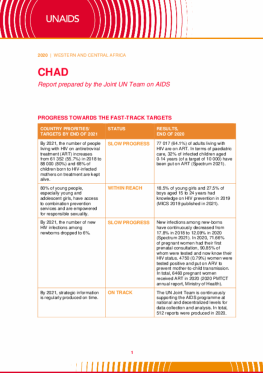Community- and facility-based HIV treatment and support services were strengthened through the development of several guides and tools, such as the differentiated service delivery (DSD) guidelines, and the training of 456 health workers, 103 community agents and 1961 people living with HIV on DSD. In addition, 50 monitoring and evaluation experts gained better knowledge on data collection and management, thus improving the quality of available data. By end 2023, DSD was implemented in 187 healthcare facilities and 44 sites were providing services for the prevention of vertical transmission of HIV, thanks to the Joint Programme’s support. Following the training of 20 social media influencers on HIV and sexually transmitted infections, a large Undetectable=Untransmittable campaign was launched, further informing people on the fact that people living with HIV under treatment with an undetectable viral load cannot transmit HIV (UNAIDS Secretariat). A total of 1961 people living with HIV, predominantly young people were sensitized on HIV treatment; and 250 people living with HIV received cash transfers boosting their adherence to treatment.
As a result of the enhanced capacity of health professionals and improved monitoring of services through Joint Programme’s support, around 707 500 pregnant women accessed HIV testing and those found positive were enrolled in programmes for the prevention of vertical transmission (UNICEF, WFP, UNAIDS Secretariat).
Communities and networks of people living with HIV key populations were empowered to actively participate and lead the HIV response, thanks to the strategic support from the Joint Programme. For instance, 50 people from 45 civil society and community organizations improved their understanding of the Global Fund New Funding Model 3 and their roles in its implementation through a special workshop. A total of 14 civil society and faith-based organizations and 36 leaders from 10 community groups and associations received training on various topics, including leadership, governance, project management, human rights and DSD. In addition, 19 adolescents and young people, people living with HIV and key population associations received financial and technical support to implement community-led HIV, hepatitis, human rights and DSD services. A total of 29 civil society organizations developed a roadmap to intensify their participation in the HIV, tuberculosis and malaria responses (UNAIDS Secretariat). Furthermore, some 147 people living with HIV, including adolescents and young peer educators and mother mentors, implemented peer education activities in health facilities and community events strengthening social cohesion, peer support and positive living (UNICEF, UNAIDS Secretariat)
As a result of the Joint Programme’s capacity building initiatives, over 100 adolescents and young people, legal experts and human resources staff of private companies improved their understanding of Law No. 19/PR/2007 on combating HIV/AIDS and sexually transmitted infections and protecting the rights of people living with HIV, Law 006/PR/2002 on reproductive health, as well as on the care and support mechanisms available for people living with HIV (UNDP, UNAIDS Secretariat).
Chad mobilized close to Euro 140 million from the Global Fund Grant Cycle 7 for the national HIV, tuberculosis and malaria responses (including over Euro 55 million for HIV) in 2025-2027, with technical support and coordination provided by the Joint Programme (UNAIDS Secretariat).





